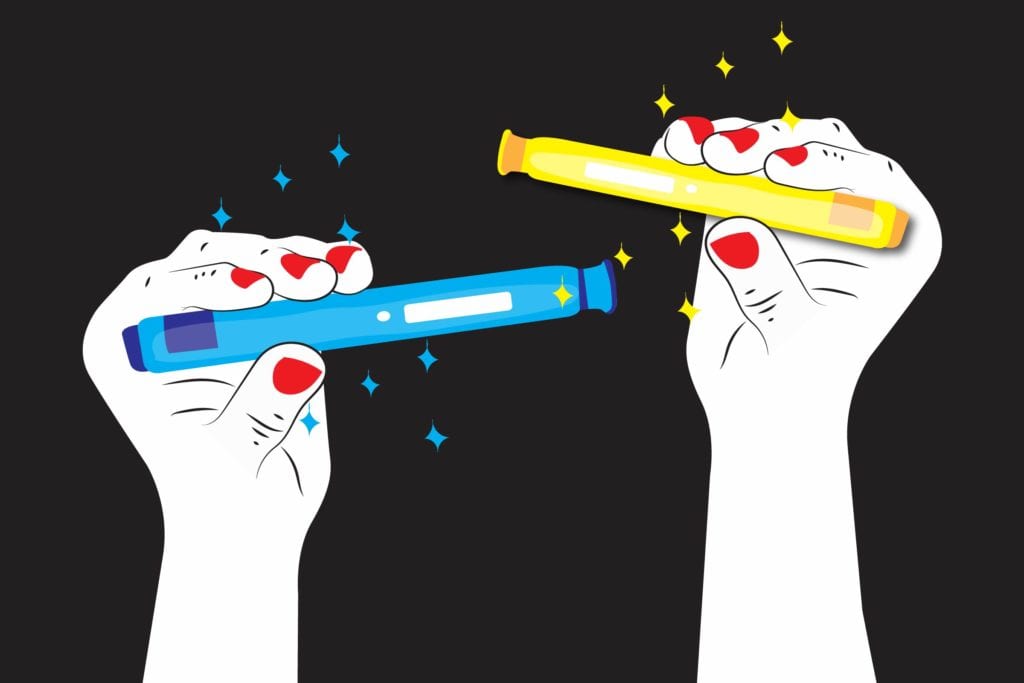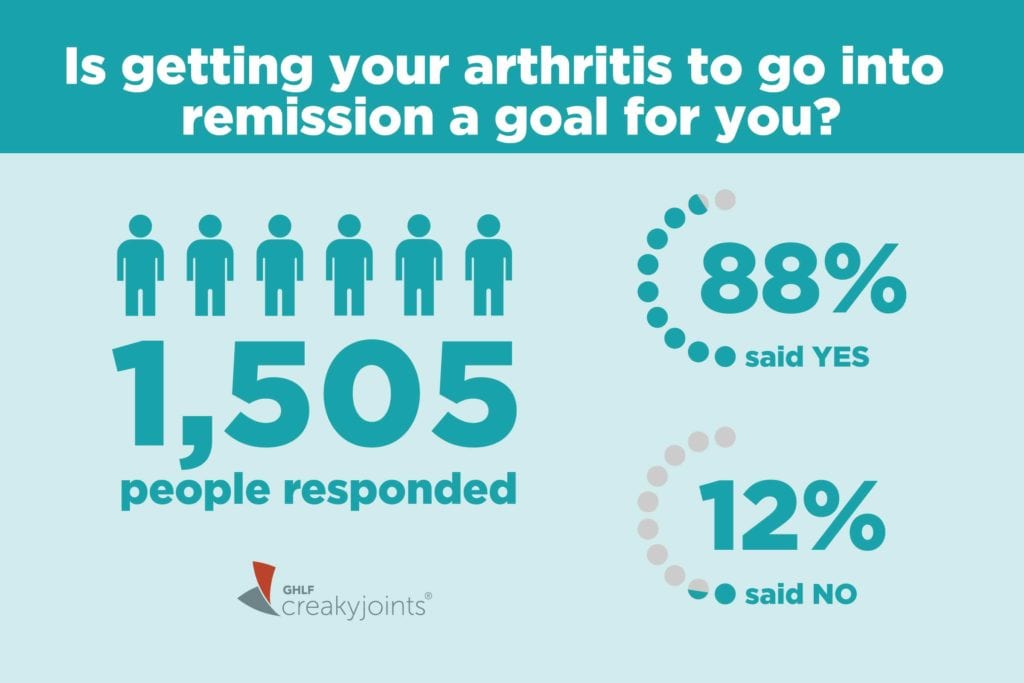How Do You Know if Rheumatoid Arthritis Is in Remission When on a Med

When you're first diagnosed with an inflammatory form of arthritis such as rheumatoid arthritis (RA) — which is chronic and progressive — you take many questions about what's side by side. Will my hurting and other symptoms always improve? What kind of long-term damage will the illness cause? What are the medications I'll accept to take (and what are the possible side effects)? Is disease remission possible?
When we asked members of CreakyJoints and ArthritisPower, our patient-powered research registry, in a contempo Community Poll if achieving remission was a goal for them, 88 percent of i,505 respondents said yes.
Decades agone, remission wasn't conceivable for virtually patients, but thanks to advances in treatment, a proliferation in treatment options, and a more focused "treat to target" philosophy amid rheumatologists, getting to remission is a possibility for many patients. "Treat to target" means picking a disease management goal (such every bit depression illness activity or remission) and working with your doctor to accommodate your treatment plan as needed in club to meet that target.
According to a 2017 newspaper about sustained remission in RA, the goal of treatment has evolved in recent decades from managing symptoms to preventing disability and long-term harm to early and persistent remission.
If remission is a goal for yous, don't be shy about letting your rheumatologist know. Your run a risk of hitting remission is higher if you're proactive near it.
"Aiming for remission might hateful increasing the intensity of medication treatment," says Mayo Dispensary rheumatologist John K. Davis, III. "This could mean higher doses of medications or using combinations of medicines to attain greater disease control. Oftentimes, this would mean taking a biological medication or targeted synthetic medication."
While you may hear stories about people going into remission without medication, this is quite rare. Patients cannot rely on lifestyle or dietary changes solitary to reverse the course of disease, though of course these are helpful to your overall health as part of the right medication plan.
Now that remission is a possibility for many patients with rheumatoid arthritis and other kinds of inflammatory arthritis, information technology's of import to educate yourself on what remission is, how doctors measure information technology, and how to stay there once you've achieved it. Read on for some important information about remission.

1. Doctors and patients together make up one's mind when a patient has achieved remission
Doctors have different means to evaluate whether your disease is in remission. The i most commonly used in function settings is called the DAS-28, says CreakyJoints medical advisor Vinicius Domingues, MD.
DAS stands for disease activity score, and 28 stands for the number of joints doctors evaluate. The DAS-28 looks at how many of your joints are swollen and how many are tender (in pain). Information technology combines this with the results of a blood examination that measures inflammation, such as C-reactive protein or erythrocyte sedimentation rate (ESR), also equally patient ratings of their ain hurting and role. It and then plugs these numbers into an algorithm to determine an overall number on a calibration between 2 and 10.
The formal definition of remission using DAS-28 is less than 2.half-dozen. This indicates that your level of inflammation is depression and your disease is less likely to cause underlying impairment to your joints and other organs.
"I attempt to brand analogies to aid patients understand 'absence of inflammation' in remission, like 'putting the burn down out,'" says Dr. Davis. Dr. Domingues describes RA in remission equally beingness dormant, asleep, or hibernating.
"Information technology is important to get the patient's perspective on what remission might hateful to them. This tin help get the patient and provider on the same page. I point this often means no pain, no articulation swelling, proficient slumber, improved energy and vitality, and getting back to usual activities. But RA is a diverse disease process, and patients can be affected differently, hence it is important to get the individual's perspective," says Dr. Davis.
Y'all can use our ArthritisPower app to track your symptoms and affliction activity and share your results with your doctor. This information can exist very helpful when discussing remission with your physician.
two. Treating illness early and aggressively helps patients enter remission
Every bit noted higher up, spontaneous remission in inflammatory arthritis is rare. Patients who get their arthritis into remission normally are on a disease-modifying medication (DMARD), and often a combination of disease-modifying medications, within the first half-dozen months later existence diagnosed.
While you have a lot of information to process after you've just been diagnosed with a affliction similar rheumatoid arthritis, information technology's important to move swiftly and showtime medication to increment your chances of getting to remission. Enquiry shows achieving remission is less common among people with long-established disease.
"In large cohort studies, the frequency of remission at a given time is effectually 20 percent. It is known to be easier to attain remission using intensive, 'treat-to-target' treatment strategies using today'due south medications. Such patients may achieve remission upwardly to 50 to seventy percent of the fourth dimension," says Dr. Davis.
3. You can still have flares and pain while you lot're in remission
Being in remission in RA doesn't necessarily mean yous no longer accept pain or discomfort. You tin can have intermittent bouts of flares or pain while you're in remission. "Often a short grade of steroids can be enough to stop the flare, and then you become dorsum to a wheel of maintenance," says Dr. Domingues. "It is common, and patients should not be discouraged nearly that."
Likewise, co-occurring diseases are common amongst inflammatory arthritis patients, notes Dr. Domingues. If patients have disease activity scores that indicate low levels of inflammation and few affected joints, but are still experiencing hurting, this could signal other diseases such equally fibromyalgia or osteoarthritis. "Nosotros need to empathise exactly the culprit for your pain, because the treatment is very different for fibromyalgia than for rheumatoid arthritis than for osteoarthritis," Dr. Domingues explains.
four. Remission doesn't mean y'all're cured
This is the biggest misconception Dr. Domingues hears about remission. "We need to understand that rheumatoid arthritis is a chronic status that, every bit of 2019, at that place's no specific cure for. We have great treatment, just we don't have a cure," he says.
Translation: Going into remission doesn't mean you lot will stay there indefinitely. These diseases are like a roller coaster, says Dr. Domingues. "Sometimes we become up, sometimes we go down. At that place's a lot of unpredictability about that, but medications are the cornerstone to try to maintain it."
5. Remission may hateful you tin taper your medications, but non e'er
If you go into remission, you may want to run into if you can alter your medication regimen to lower your dosages or take fewer medications — or meet if yous can end taking medication altogether, even if temporarily. Some people refer to this as a "drug holiday." It's natural to want to reduce your medications, given that all drugs come with side effects and expenses. Simply whether yous can actually remain in remission while tapering or stopping medication is something rheumatologists are actively studying. As of now, doctors don't have a good mode of predicting who will be able to stay in remission after reducing or stopping medication and who won't.
Stopping medication not only means risking that yous could autumn out of remission and experience pain and other arthritis symptoms, but besides means that the same medications might not work besides if you need to restart them in the future.
six. Remission isn't only about reducing pain, but likewise about avoiding long-term health problems
Being in remission means less inflammation throughout the whole torso, which can accept protective effects on other organs, such equally your heart. Rheumatoid arthritis raises your risk for heart illness and heart attacks, simply achieving and sustaining remission can help lower such risks.
RA and other inflammatory arthritis can also cause permanent joint damage when inflammation remains loftier. "From a joint perspective, you're sparing destruction if you lot are in remission," says Dr. Domingues.
7. Your lifestyle habits tin bear upon remission, too
While the right medication programme is often the well-nigh of import office of getting to and staying in remission, other factors can play a part besides. A studypresented at the annual coming together of the American College of Rheumatology in 2018 constitute that for women, being obese more than doubled the risk of not achieving remission within 12 months. For men, current smokers were 3.5 times less likely to achieve remission. Stress may play a function too, says Dr. Domingues, who advises trying to be enlightened of your stress levels and when they feel out of command for you lot. "It's easy to say, hard to practise," he acknowledges.
Proceed Reading
- Remission and Low Affliction Activity in Rheumatoid Arthritis: What It Actually Ways
- You're Much More than Probable to Hit Remission in Psoriatic Arthritis with This Kind of Treatment Plan
- The 4 Stages of RA Progression
- Was This Helpful?
Source: https://creakyjoints.org/treatment/achieving-remission-arthritis-goal-for-patients/
0 Response to "How Do You Know if Rheumatoid Arthritis Is in Remission When on a Med"
Enregistrer un commentaire